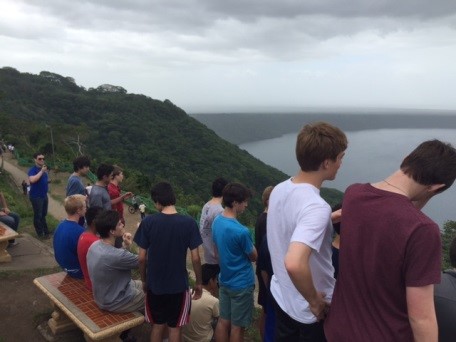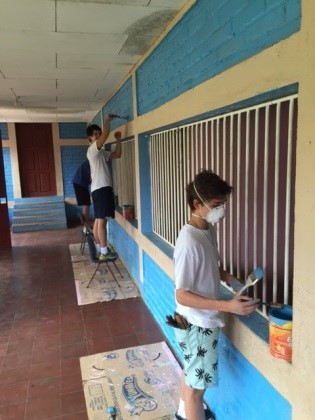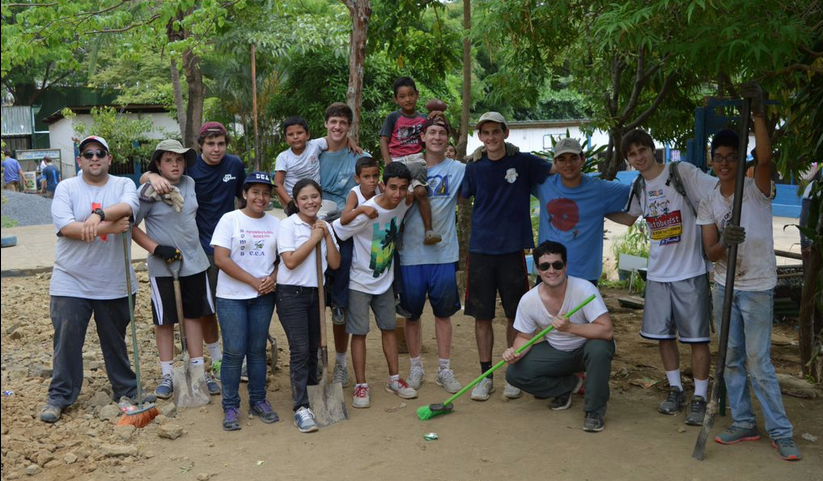A bustling group of young teenagers with the Jesuit logo plastered across their chest and elderly folks wearing their native clothes, approach a golden beach. Soon one group ventures into a separated small lagoon, marked by a shallow sand bar, while another settles down by some rocks overlooking the ocean. At the lagoon, the elderly wade into the water with their Jesuit companions, who support and walk alongside them. At the rocks, old and young alike share stories of their homelands. Under the setting orange sun, blurred by faint clouds, the group of people remain at the beach and immerse themselves in not only Nicaragua, but also each other.
Throughout June 2 to June 11, fourteen Jesuit students, along with teachers embarked on an 8-day immersion trip into urban Nicaragua. Here, they visited the cities of León and Managua, engaging in activities and travels that taught them about the culture, history, and the language of the country.

The group first arrived at a hotel in Nicaragua on the night of Saturday, June 2, and initiatedtheir trip with a big family dinner, growing together as a new community of individuals. The next day, they journeyed into the mountains and explored a cloud forest which led them to a dormant volcano named “El Mombacho.” From there, they then traveled to a ropes course in the forest and enjoyed the beauty of the country as they soared through the tree tops.
Commenting on the group’s experience and its impact upon their trip, Mr. Ornelas noted that “it helped team bonding because most everyone on the trip hadn’t zip lined before, so they got to experience something brand new together.” After these initial excursions, exposing the group to the scenery of Nicaragua, they soon ventured into the city to engage with the people.

As part of their immersion within the country, the Jesuit group engaged with many marginalized communities. The first of these was a girl’s orphanage in the city of El Crucero, where they worked on the building and met the residents. Some of the students painted the kitchen and classrooms while others talked and played with the girls. They all set forth to establish a close connection with everyone there. In addition to this, with the help of nuns who worked in the orphanage, they cooked and prepared lunch for everyone there, enjoying a communal meal.
From here, their journey took them to a special needs school in the colonial city of León. Here, they first started a beautification project working on a garden and cleaning up the school’s park. After cleaning and renovating their facilities, the Jesuit students then engaged with the kids at the school, helping them with activities and providing them with a person to talk to. Sharing a particular memory from the school, Will Fynes ’18 stated “my favorite part of the trip was playing the special-needs kids and their principal in basketball. Everyone was having a blast and at that moment I felt really connected to the people we were working with.”
Finally, after the special-needs school, they then visited an elderly home which housed many individuals with no family members and no other place to stay. Providing them with some much-needed company, the students shared stories and conversed with the elderly. In addition, they hosted an ice-cream social for everyone there, and topped the day off with a day to the beach. Throughout these three organizations, the orphanage, the school, and the elderly home, the students not only created strong relationships between themselves and the people they worked with, but also grew closer to each other as well.

In their trip to Nicaragua, the group traveled across the country and exposed themselves to various communities, learning new things about the people and the culture everyday. As members of Jesuit are trained to do, they saw God through these experiences and grew in another major component of this trip: spirituality. To enhance this growth, the group gathered together each night to engage in fellowship which involved reflection, journaling, dialogue, and scripture. In addition, they came together for mass throughout the week, reflecting on their experiences through worship and communication with God.
Finally, before a day of service out in Nicaragua, they would say a morning prayer together and discuss how they can see God through the world. Sharing a part of this discussion, Mr. Ornelas explained his advice to the students: “for example, if it’s a rigorous day in the garden, how can we see God in the environment? If we’re working with the elderly, how is companionship and forming relationships strengthening our connection with God. If we’re working with children, how can we help them grow stronger in their faith.”
Reflecting on this message, Will Fynes ’18 took this message to heart: “I think we hear the idea that God is in every single person, but I think if my time in Nicaragua taught me anything, it is that God really does exist in every person.” Throughout this unique trip to Nicaragua, the group set out to grow in their faith, and it turns out, they were very successful.
The urban Nicaragua trip immersed a group of teachers and 14 students in the lifestyle and culture of the country. They explored the exotic environment, traveling up a volcano and zooming down a zip-lines in the forest. They engaged with the marginalized communities in various cities, working with orphans, special-needs kids, and the elderly. Most importantly though, they formed lasting relationships with their home group and the locals of the country, actively striving to become men for others.
If you are interested in journeying to Nicaragua next summer, contact Mr. Ornelas or Mr. Perry.






